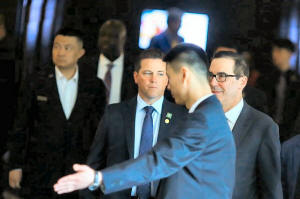|
China, U.S. reach some deals in trade row
but differences still relatively big: Xinhua
 Send a link to a friend
Send a link to a friend
 [May 04, 2018]
By Sue-Lin Wong and Elias Glenn [May 04, 2018]
By Sue-Lin Wong and Elias Glenn
BEIJING (Reuters) - Top officials from
China and the United States reached a consensus on some aspects of the
countries' trade row, but disagreements over other issues remain
"relatively big", according to China's Xinhua news agency on Friday.
The two sides, though, committed to resolving their trade disputes
through dialogue, state-run Xinhua reported.
And the U.S. negotiators agreed to bring up with U.S. President Donald
Trump the question of a ban on U.S. companies selling goods and software
to Chinese telecommunication equipment maker ZTE Corp after
representations from the Chinese side, the report said. ZTE faced the
seven-year ban after the U.S. said it failed to keep to an agreement it
made after breaching U.S. sanctions.
The talks over the past two days have involved a high-level U.S. trade
delegation led by Treasury Secretary Steven Mnuchin and top Chinese
officials, including Vice Premier Liu He, following months of threats
and counter threats from both sides in a series of disputes over trade
practices.

The U.S. team has already left Beijing and is heading back to the U.S.,
a U.S. official told Reuters early on Friday evening. The Americans have
yet to give their account of the talks.
The trade discussions had been "candid, efficient and constructive,"
Xinhua said, but gave almost no details on what the officials had
agreed.
The officials exchanged opinions on resolving tariffs and non-tariffs
measures, on expanding two-way investment and the protection of
intellectual property, and on expanding U.S. exports to China and
bilateral services trade, Xinhua reported. It gave no indication of what
actions might be taken based on those exchanges.
"My impression was that (the talks) didn't go well given the rhetoric,"
said Kevin Lai, senior economist at Daiwa Capital markets in Hong Kong.
"I think the divide is still very big."
The United States has proposed tariffs on $50 billion of Chinese goods
under its so-called "Section 301" intellectual property probe. Those
could go into effect in June following the completion of a 60-day
consultation period, but activation plans have been kept vague.
China has said its own retaliatory tariffs on U.S. goods, including
soybeans and aircraft, will go into effect if the U.S. duties are
imposed.
The U.S. tariffs focus heavily on technology products benefiting from
the "Made in China 2025" program, which promotes the development of 10
sectors including aerospace, robotics and clean-energy cars.
A breakthrough deal to fundamentally change China's economic policies
was viewed as highly unlikely during the two-day visit, though any signs
of meaningful progress in the dispute could delay any punitive action
from the U.S.
"We are having very good conversations," Mnuchin told reporters earlier
on Friday as he left his hotel.

U.S. President Donald Trump on Thursday praised his relationship with
Chinese President Xi Jinping as the U.S delegation began their talks,
which were held at a state guest house in the western part of the
Chinese capital.
Trump has targeted China's massive trade surplus with the United States,
in recent months demanding a $100 billion annual reduction in the $375
billion U.S. goods trade deficit with China.
According to two sources with knowledge of the matter, the U.S.
delegation submitted a document to the Chinese before the talks asking
China to cut its trade surplus with the United States by $200 billion by
2020 and lower tariffs on all products to levels no higher than those
imposed by the United States.
[to top of second column]
|

U.S. Treasury Secretary and member of a U.S. trade delegation Steven
Mnuchin leaves a hotel in Beijing, China, May 4, 2018.
REUTERS/Thomas Peter

The delegation also asked China to halt subsidies for advanced
technology, the sources said.
Chinese officials believed the proposal was "unfair," the Wall
Street Journal reported, quoting people with knowledge of the
negotiations.
"I think the U.S. is asking for the impossible. Reducing the deficit
by $200 billion by 2020 is quite an unrealistic demand, but it may
also be a negotiation tactic to start high first," said Tommy Xie,
economist at OCBC Bank in Singapore.
NO ILLUSIONS
U.S.-based trade experts have said they expected Beijing to offer
Trump's team a package of policy changes that may include some
previously announced moves, such as a phase-out of joint venture
requirements for some sectors, autos tariff reductions and increased
purchases of U.S. goods.
U.S. complaints about Chinese intellectual property abuses are at
the core of the current dispute. The Trump administration says U.S.
companies lose hundreds of billions of dollars annually to China's
theft of trade secrets.
Members of the Trump administration's delegation to Beijing for
talks to try to stave off a trade war between the world's two
largest economies included U.S. Trade Representative Robert
Lighthizer, a hard-line and experienced trade negotiator.
Lighthizer said on Tuesday it was not his objective to change
China's economic system, but that he would try to find ways to limit
the damage it causes to the United States and open it further for
U.S. companies.
Some economists noted that the deficit with China was the natural
result of the large amount of manufacturing assembly of U.S.
products, such as iPhones, that takes place in China.

"As long as China remains the assembly hub of the world, it's always
going to have a large trade surplus with developed consumer
countries like the U.S. and the E.U. and that's not necessarily a
problem," said Julian Evans-Pritchard, senior China economist at
Capital Economics.
The U.S. delegation also included Commerce Secretary Wilbur Ross and
White House trade and manufacturing adviser Peter Navarro, a noted
China trade hawk.
Navarro advised Trump throughout his 2016 election campaign, during
which the candidate routinely threatened to impose a 45 percent
across-the-board tariff on Chinese goods as a way to level the
playing field for American workers.
(Reporting by Sue-Lin Wong and Elias Glenn. Additional reporting by
Michael Martina, Shu Zhang, Kevin Yao and Philip Wen in BEIJING and
Adam Jourdan in SHANGHAI. Writing by Ben Blanchard and Ryan Woo.;
Editing by Lincoln Feast and Martin Howell)
[© 2018 Thomson Reuters. All rights
reserved.]
Copyright 2018 Reuters. All rights reserved. This material may not be published,
broadcast, rewritten or redistributed.
Thompson Reuters is solely responsible for this content.
 |